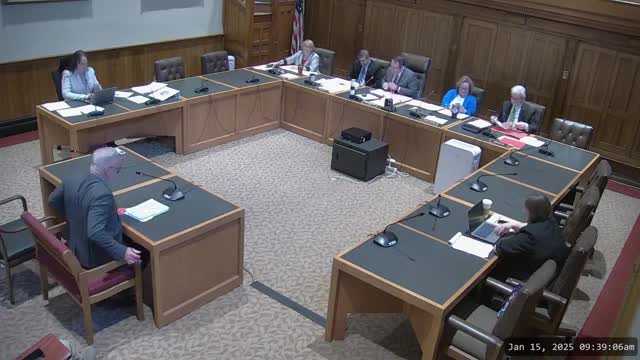Heated hearing on copay accumulators leaves bill undecided as stakeholders clash over patient access and premiums
Get AI-powered insights, summaries, and transcripts
Subscribe
Summary
Senate Bill 17, which would require insurers to count third‑party copay assistance toward deductibles and out‑of‑pocket maximums, drew extensive testimony from patient advocates, insurers, PBMs and hospitals. The committee did not take executive session on the bill and deferred further action.
The Senate Health and Human Services Committee heard hours of testimony on Senate Bill 17, a proposal to prevent insurers from using copay accumulator and maximizer programs that exclude third‑party copay assistance from a patient’s deductible or out‑of‑pocket maximum.
Sponsor Sen. Dan Innes framed the bill as an affordability measure for patients with high cost specialty drugs, saying copay assistance "isn't a discount or coupon nor is it a way to steer patients away from or toward branded medications." He told the committee an estimated 310,000 New Hampshire patients could be affected if the change is enacted, and said the bill would require that patient assistance count toward cost‑sharing so patients are not exposed to unexpected, large costs.
Patient advocates and disease‑specific groups urged passage. Susanna von Ettingen, the New England Bleeding Disorders Advocacy Coalition state lead and mother of a man with severe hemophilia, described her family’s difficulty in finding a marketplace plan that did not use accumulators and recounted how cost pressures can lead patients to delay or ration lifesaving medicines. "If he has to decide between rent, electricity, or a monthly co pay of 250 or more for specialty medications, it's highly likely that he will put off his biweekly prophylactic doses," she said.
The American Cancer Society Cancer Action Network and other patient groups also supported the bill, arguing that accumulators undermine access to needed therapies and may produce worse outcomes and higher downstream costs. Mike Rollo of ACS CAN told the committee the legislation would not mandate coverage decisions and would leave utilization tools such as prior authorization and step therapy in place.
Insurers, PBMs and the hospital sector strongly opposed the bill as drafted. Paula Rogers of America’s Health Insurance Plans (AHIP) said the bill as written "is a one‑size‑fits‑all approach" that could increase premiums and disrupt benefit design, and she urged narrower, targeted changes or means‑tested carve‑outs focused on patients with no clinical alternatives. Anthem, PCMA (the PBM trade association) and others warned the bill could steer patients to more expensive brand drugs and that manufacturers use coupons as a marketing tool; PCMA witnesses said manufacturers sometimes deploy coupons to preserve market share for higher‑priced drugs. PBM testimony cited studies and modeling suggesting broader premium effects if third‑party assistance were treated as plan member payments.
Several witnesses and committee members also noted competing and unresolved evidence: some studies cited by patient advocates found no material premium effects in states that ban accumulators, while industry witnesses pointed to other analyses that project premium increases.
After extended testimony the committee did not take executive session on SB 17; a committee member noted the Insurance Department and other stakeholders were not present and the committee deferred additional action. Committee members and witnesses signaled willingness to continue discussions, including narrower carve‑outs for patients without therapeutic alternatives or options such as extending manufacturer assistance through the full plan year and adding notification requirements so plans can track coupons at point of sale.
No formal committee vote was recorded on SB 17 during the hearing day.
